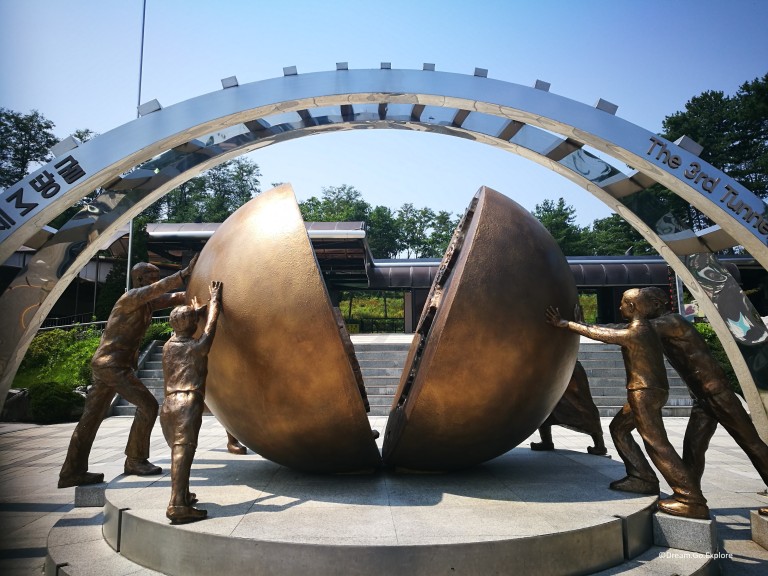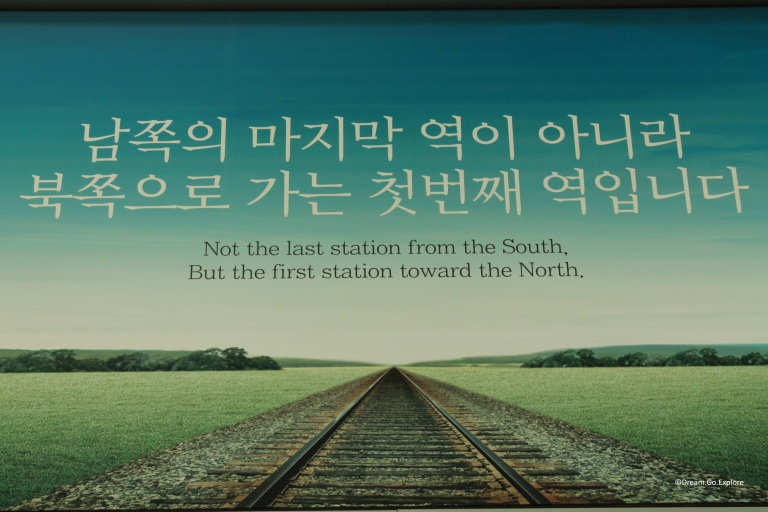
North Korea, an isolated and secretive country. Nowhere else you can get as close to North Korea as in the Demilitarized Zone (DMZ) on both sides of the inner Korean border. The DMZ is a demilitarized zone. It divides the Korean Peninsula into North and South Korea. It was established after the three-year Korean War in 1953 and runs from west-southwest to east-northeast across the peninsula, cutting the 38th degree of latitude parallel north of Seoul, which formed the border between the two states until the outbreak of war.

The DMZ can only be visited on organized tours from Seoul. Strict security rules apply. Already on the way to the actual DMZ we notice watchtowers and fences along the river, which are intended to ward off North Korean invasions. First we visit Dorsan Peace Park, on the edge of the DMZ. There is a temple of peace and a peace bell, a bombed locomotive from the Korean War, and an equally bombed bridge that leads nowhere over a river.

Then we pass a passport control and reach the DMZ. Next stop on the trip is the Dora platform. From the platform you can see deep into North Korea. From here you can see the place Kijŏng-dong (“Peace Village”). It is considered to be a “propaganda village”, which is said to house mainly North Korean soldiers. The tour continues to the third infiltration tunnel.

The North Korean military had the approximately 1.7-kilometer-long tunnel dug under the border – presumably to start a surprise attack on the south. This did not happen because the 73-meter underground structure was discovered in 1978 before it was completed. Through a low and narrow tunnel, we move towards the North Korean border. After about ten minutes, the path is blocked with a block of concrete and lots of barbed wire. Now we are only a few meters away from the border.

Before we return to Seoul we visit Dorasan train station. This new building is a symbol of hope. As soon as the two Koreas reunite, regular trains to Pyongyang will run here. Hopefully this will soon be the case in the near future.

Nordkorea, ein rätselhaftes und verschlossenes Land. Nirgendwo kann man Nordkorea so nahe kommen, wie in der Demilitarisierten Zone (DMZ) beidseitig der innerkoreanischen Grenze. Die demilitarisierte Zone (DMZ) ist eine entmilitarisierte Zone. Sie teilt die Koreanische Halbinsel in Nord- und Südkorea auf. Sie wurde nach dem drei Jahre dauernden Koreakrieg im Jahre 1953 eingerichtet und läuft von West-Südwest nach Ost-Nordost quer über die Halbinsel, wobei sie nördlich von Seoul den 38. Breitengrad schneidet, der bis zum Kriegsausbruch die Grenze zwischen beiden Staaten bildete.

Die DMZ kann nur auf organisierten Touren vo Seoul aus besucht werden. Es gelten strenge Sicherheitsregeln. Schon auf der Fahrt zur eigentlichen DMZ fallen uns Wachtürme und Zäune entlang des Flusses auf, welche der Abwehr von nordkoreanischen Invasionen dienen soll.

Zunächst geht es zum Dorsan Friedenspark, am Rande der DMZ. Hier gibt es einen Friedenstempel zu sehen und eine Friedensglocke, darüber hinaus eine zerbombte Lokomotive aus dem Koreakrieg, und eine gleichermaßen zerbombte Brücke, die über einen Fluss ins nirgendwo führt.

Anschliessend passieren wir durch eine Passkontrolle und erreichen die DMZ.
Das nächste Ziel, das wir ansteuern, ist die Dora-Plattform. Von der Plattform kann man tief nach Nordkorea hineinzusehen. Von hier aus kann man den Ort Kijŏng-dong („Friedensdorf“) sehen. Es gilt als „Propagandadorf“, in dem sich hauptsächlich nordkoreanische Soldaten aufhalten sollen. Die Tour geht weiter zum Dritten Infiltrationstunnel.

Den rund 1,7 Kilometer langen Tunnel hatte das nordkoreanische Militär unter der Grenze hindurch graben lassen – vermutlich um einen Überraschungsangriff auf den Süden zu starten. Dazu kam es nicht, da das rund 73 Meter unter der Erde verlaufene Bauwerk 1978 vor der Fertigstellung entdeckt wurde. Durch einen niedriegen und engen Tunnel bewegen wir uns Richtung nordkoreanischer Grenze.

Nach etwa zehn Minuten ist der Weg mit einem Betonklotz und jeder Menge Stacheldraht versperrt. Nun bfinden wir uns nur noch wenige Meter von der Grenze entfernt. Bevor wir nach Seoul zurückkehren besuchen wir noch den Bahnhof Dorasan. Dieser Neubau soll ein Zeichen der Hoffnung sei. Sobald sich die beiden Koreas wieder vereinigt haben, würden hier die regulären Züge nach Pjöngjang verkehren. Bleibt zu hoffen, dass dies in naher Zukunft der Fall sein wird.


Danke für den sehr informativen Bericht.
Diese Tour habe ich nicht unternommen. Mich hätte eher die Joint Security Area interessiert, wo sich nord- und südkoreanische Soldaten direkt gegenüber stehen. Während meines Aufenthalts im April 2019 war die Zone leider gesperrt und erst am Tag meiner Abreise Anfang Mai war die Tour wieder möglich .
LikeLiked by 2 people
Ja sehr schade. Das wäre sicherlich eine sehr spannende Tour gewesen.
LikeLiked by 3 people
I’m grateful for All of your beautiful sharing throughout the year. You help to take me to places all around the world. May all be well with you and yours 😊❤️
LikeLiked by 2 people
Thank you so much for your kind words ❤. Wishing you a Merry Christmas and all the best for 2020 🎄🎆.
LikeLiked by 2 people
Thank you kindly!! Merry Christmas 🎄 and a Joyful New Years 🌟🎄
LikeLike
Unfortunately, we humans are better at building borders than at tearing them down. 😦
LikeLiked by 1 person
👍👍👍
LikeLiked by 1 person
Very special place. Was there in 2014. https://tripbytrip.org/2018/04/29/photos-koreas-dmz-and-joint-security-area-jsa-up-close-and-personal/
It makes you realise war is a real, existing hing.
LikeLiked by 1 person
👍👍👍
LikeLiked by 1 person
It appears that North Korea is tilting away from peace again. The next weeks will tell. WE all hope for the best. Fröhliche Weihnachten aus North Carolina.
LikeLiked by 1 person
Wishing you a Merry Christmas and a happy 2020.⛄❄🌲🎄🎉
LikeLiked by 1 person
Amazing, Im Korean and I didnt even go there yet! I hope to someday 🙂 Thanks for sharing DMZ
LikeLiked by 1 person
Tang you so much. You really have to do that. It’s quiet interesting. 😁🤗😁🙏🙏🙏
LikeLike